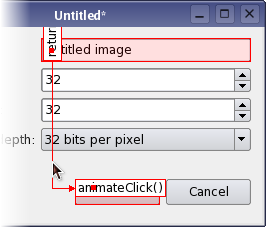Priority: P3: Somewhat important. Done Affects Version/s: Qt Creator 3.3.0-rc1. QTCREATORBUG-17578 Invalid parentheses added to signal/slot names. Let's say I have a signal change connected to a slot notify. If the change signal is emitted, the notify slot will start executing. Now what happens if a second change signal is emitted and the first notify slot didn't finish its execution? Is the second slot launched concurrently with the first? And if so, is Qt handling the thread-safety.
Introduction
Remember old X-Window call-back system? Generally it isn't type safe and flexible. There are many problems with them. Qt offer new event-handling system - signal-slot connections. Imagine alarm clock. When alarm is ringing, signal is sending (emitting). And you're handling it as a slot.
- Every QObject class may have as many signals of slots as you want.
- You can emit signal only from that class, where signal is.
- You can connect signal with another signal (make chains of signals);
- Every signal and slot can have unlimited count of connections with other.
- ATTENTION! You can't set default value in slot attributes. e.g.
void mySlot(int i = 0);
Connection
You can connect signal with this template:QObject::connect ( const QObject * sender, const char * signal, const QObject * receiver, const char * method);You have to wrap const char * signal and const char * method into SIGNAL () and SLOT() macros.
And you also can disconnect signal-slot:QObject::disconnect ( const QObject * sender, const char * signal, const QObject * receiver, const char * method);
Deeper
Widgets emit signals when events occur. For example, a button will emit a 'clicked' signal when it is clicked. A developer can choose to connect to a signal by creating a function (a 'slot') and calling the connect() function to relate the signal to the slot. Qt's signals and slots mechanism does not require classes to have knowledge of each other, which makes it much easier to develop highly reusable classes. Since signals and slots are type-safe, type errors are reported as warnings and do not cause crashes to occur.
For example, if a Quit button's clicked() signal is connected to the application's quit() slot, a user's click on Quit makes the application terminate. In code, this is written as
Qt Signal Slot Priority Package
connect(button, SIGNAL (clicked()), qApp, SLOT (quit()));
Qt Signal Slot Priority Box
Connections can be added or removed at any time during the execution of a Qt application, they can be set up so that they are executed when a signal is emitted or queued for later execution, and they can be made between objects in different threads.
The signals and slots mechanism is implemented in standard C++. The implementation uses the C++ preprocessor and moc, the Meta-Object Compiler, included with Qt. Code generation is performed automatically by Qt's build system. Developers never have to edit or even look at the generated code.


